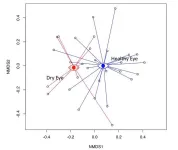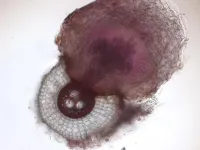(Press-News.org) A team of researchers from Columbia University Irving Medical Center (CUIMC) and Columbia Engineering has been awarded up to a $38.95 million contract from the Advanced Research Projects Agency for Health (ARPA-H) to build a living knee replacement from biomaterials and human stem cells, including a patient’s own cells. ARPA-H is a federal funding agency that funds transformative biomedical and health research breakthroughs, rapidly translating research from the lab to applications in the marketplace.
The Award
The award, part of the ARPA-H’s Novel Innovations for Tissue Regeneration in Osteoarthritis (NITRO) program, will support the development of NOVAJoint, a revolutionary biocompatible, low-cost, patient-specific knee joint replacement. This high-risk project builds upon more than two decades of collaborative musculoskeletal research at Columbia in engineering and medicine, and promises to offer a transformative solution for the more than thirty million people in the U.S. who suffer from osteoarthritis. NITRO is the first Health Science Futures specific program under the new ARPA-H agency, established by the Biden Administration.
The project is led by Clark T. Hung, Professor and Vice Chair of the Department of Biomedical Engineering and Professor of Orthopedic Science (in Orthopedic Surgery) at Columbia Engineering, and Nadeen O. Chahine, Associate Professor of Biomedical Engineering in the Department of Orthopedic Surgery at Columbia University Vagelos College of Physicians and Surgeons, leaders in tissue regeneration and orthopedic research.
“ARPA-H is a hugely important endeavor that could bring about a breakthrough in personalized and patient-specific solutions,” said Shih-Fu Chang, Dean of Columbia Engineering. “As society seeks to address the challenge of population aging, such collaborative approaches combining engineering and medicine will help improve conditions for those with osteoarthritis and many other musculoskeletal conditions.”
“We saw during the COVID pandemic just how fast science can move when teams of researchers are given the support and resources to work together,” said Katrina Armstrong, Dean of the Faculties of Health Sciences and the Vagelos College of Physicians and Surgeons, and Executive Vice President for Health and Biomedical Sciences, Columbia University. “By focusing Columbia’s expertise in biomedical engineering and orthopedic surgery onto a single goal, this funding from ARPA-H has the potential to rapidly revolutionize the way we treat osteoarthritis and the way we do biomedical research in the future.”
Impact of Osteoarthritis
Osteoarthritis is a degenerative joint disease that is the most common type of arthritis. It gradually worsens over time as cartilage, the specialized connective tissue that covers the ends of bones, wears down, leading to pain, stiffness, and loss of mobility. Osteoarthritis is already the third most common type of disability and has an estimated economic burden of more than $136 billion per year. It disproportionately affects women, the elderly, certain racial/ethnic minorities, and those with lower socioeconomic status. The prevalence of knee osteoarthritis has been rising due to aging of the population, increasing rates of joint injury, and, significantly, obesity.
The clinical gold standard treatment for knee joints ravaged by pervasive OA or traumatic injury is a total joint replacement using prosthetic implants made of metal and plastic. Although knee replacement is widely successful, there are some major drawbacks to these conventional materials. There can be life-changing complications and limitations of current artificial knee replacements, including infection, loosening, hardware failure, stiffness, abnormal kinematics (i.e., the way a knee moves), instability, and persistent pain. Historically, knee replacements have had a limited lifespan with a portion failing at 15 to 20 years due to plastic wear or implant loosening. This means that younger patients may need one or even two revision implants. The demand for total knee replacements is projected to grow by 673% -- 3.48 million procedures from 2005 to 2030 -- with total knee revisions projected to grow 601% between 2005 to 2030.
NOVAJoint — a living solution to ravaged knees
With the ARPA-H award, the researchers propose to design NOVAJoint to address the urgent, unmet clinical need for a permanent solution for patients with advanced OA where a conventional knee replacement is indicated. The project’s goal is to develop a replacement knee of regenerated living cartilage and bone that integrates seamlessly with the native bone and restores pain-free joint function. Since cells are required to regenerate and maintain this living implant, the team will create two versions of NOVAJoint: a version that uses patient’s own cells and one that uses donor cells. The researchers expect NOVAJoint to substantially extend the implant life, reducing complications, and to become a permanent and final procedure for the treatment of osteoarthritis of the knee. With an aggressive timeline, in the first two years, the team will create the first prototypes before moving into preclinical and clinical studies in the final three years, including a Phase 1 safety clinical trial in the final year.
Though the first NOVAJoint is still in development, many of the technologies and scientific discoveries necessary to create the joint have already been developed and validated by Columbia researchers through funding from the National Institutes of Health, National Science Foundation, Department of Defense, and institutional support.
“The ARPA-H NITRO program has enabled us to leverage our innovative technologies and expertise to solve one of the most difficult challenges in biomedical engineering,” said Hung, a groundbreaking researcher in musculoskeletal regeneration.
The Collaborators
The NOVAJoint team will fabricate a living knee replacement using modern manufacturing techniques and capitalizes on the critical mass of musculoskeletal researchers at Columbia with collective expertise in biomechanics, biomaterials, stem cells, and orthopedic surgery from across the School of Engineering and Applied Science, Vagelos College of Physicians and Surgeons and College of Dental Medicine, building on a decades-long history of collaboration between the Departments of Orthopedic Surgery and Biomedical Engineering. The project team is multidisciplinary, with scientific leadership from faculty in the Departments of Biomedical Engineering, Mechanical Engineering, Orthopedic Surgery, and Dental Medicine. Co-PIs and Task Leads include Treena Arinzeh, Professor of Biomedical Engineering; Gerard Ateshian, Andrew Walz Professor of Mechanical Engineering and Professor of Biomedical Engineering; Alice Huang, Associate Professor of Bioengineering (in Orthopedic Surgery); and Roshan Shah, Russell A. Hibbs Associate Professor of Orthopedics (in Orthopedic Surgery) and Director of Complex Reconstruction; Chang Lee, Associate Professor of Craniofacial Engineering (in Dental Medicine).
Working with the Columbia team is James L. Cook, William & Kathryn Allen Distinguished Chair in Orthopaedic Surgery, University of Missouri, who will lead preclinical testing. Drs. Cook and Shah will also lead the clinical trial, which will be recruiting patients at both universities. The team is partnering with New York Stem Cell Foundation and New York Blood Center for GMP manufacturing of NOVAJoint.
“This is a big challenge, but by creating a large and experienced team that works well together and can be focused on one goal, we expect to succeed,” said Chahine, a leader in orthopedic research. “NOVAJoint will mark a major milestone in the field of regenerative medicine and orthopedic surgery, and has the potential to revolutionize musculoskeletal treatments of the many joints that degenerate with age or injury.”
Equity and Commercialization
In addition to the advancement in science, equity and commercialization are key pillars to the programmatic success of this project. Part of NITRO’s vision is to establish a clear path to commercialization, which is a prerequisite for successful clinical translation and impact of disruptive technologies such as NOVAJoint. ARPA-H has a firm commitment to equitable healthcare access for all, irrespective of race, ethnicity, gender/gender identity, sexual orientation, disability, geography, employment, insurance, and socioeconomic status.
“Our goal is to push knee replacement to its next stage of evolution and to create a better solution to osteoarthritis for all Americans. Every day patients ask me about new advancements in knee replacement surgery, hoping for validation of their years of suffering before seeking care,” says Dr. Shah. “Now I have something to tell them. I think the big orthopedic companies will be watching this project closely, and will be vying for the chance to commercialize NOVAJoint nationally.”
In order to meet these programmatic goals, the team will also be leveraging the expertise and resources of the Irving Institute for Clinical and Translational Research and Columbia Technology Ventures. The NOVAJoint team will include a full-time Equity Officer who will help develop key equity performance indicators. The equity officer will work closely with Rachel C. Shelton, Associate Professor of Sociomedical Sciences at Mailman School of Public Health and co-director of the Irving Institute’s Community Engagement Core Resource (CECR) and Lisa Royse, Department of Orthopedic Surgery, University of Missouri, to foster research conducted in partnership with community stakeholders to better inform the application of scientific findings to clinical and community settings.
The Research Team
The scientific and clinical faculty at Columbia include:
Clark Hung, Professor of Biomedical Engineering and Orthopedic Sciences (in Orthopedic Surgery)
Gerard Ateshian, Andrew Walz Professor of Mechanical Engineering and Professor of Biomedical Engineering
Nadeen Chahine, Associate Professor of Biomedical Engineering (in Orthopedic Surgery)
Alice Huang, Associate Professor of Bioengineering (in Orthopedic Surgery)
Treena Arinzeh, Professor of Biomedical Engineering
Chang Lee, Associate Professor of Craniofacial Engineering (in Dental Medicine)
Roshan Shah, Russell A. Hibbs Associate Professor and Director of Complex Reconstruction at Columbia University
Kam Leong, Samuel Y. Sheng Professor of Biomedical Engineering (in Systems Biology)
Helen Lu, Percy K. and Vida L.W. Hudson Professor of Biomedical Engineering and Senior Vice Dean of Faculty Affairs and Advancement
X. Edward Guo, Stanley Dicker Professor of Biomedical Engineering and Professor of Medical Sciences (in Medicine)
José McFaline-Figueroa, Assistant Professor of Biomedical Engineering
Samuel Sia, Professor of Biomedical Engineering, Vice Provost for the Fourth Purpose and Strategic Impact
Steve Thomopoulos, Robert E. Carroll and Jane Chace Carroll Laboratories Professor of Biomechanics (in Orthopaedic Surgery and Biomedical Engineering)
Elan Goldwaser, Assistant Professor of Sports Medicine (in the Center for Family and Community Medicine, in Medicine and Orthopedic Surgery) at CUIMC
Mildred Embree, Dr. Edwin S. Robinson Associate Professor of Dental Medicine
Joanna Smeeton, H.K. Corning Assistant Professor Rehabilitation and Regenerative Medicine Research (in Rehabilitation and Regenerative Medicine) (in Genetics and Development) END
ARPA-H awards Columbia researchers nearly $39M to develop a living knee replacement
Columbia biomedical engineers are collaborating with orthopedic surgeons to build a living replacement knee to be tested in clinical trials within five years.
2024-03-26
ELSE PRESS RELEASES FROM THIS DATE:
How genes work together to shape how much you smoke
2024-03-26
Take a puff of nicotine for the first time, and your DNA plays an important role, alongside social and environmental factors, in shaping what happens next.
In recent years, scientists have identified thousands of genetic variants believed to influence everything from when people first try smoking to how good that first cigarette feels to how often they light up and how hard it is to quit. Some variants influence how quickly we metabolize nicotine, while others underlie how sensitive we are to it. But little is known about how they interact with each other and with other genetic differences.
A new University of Colorado Boulder study sheds unprecedented ...
University of Oklahoma engineer receives NSF CAREER Award to advance gas sensing technologies
2024-03-26
NORMAN, OKLA. – Binbin Weng, Ph.D., an engineering professor at the University of Oklahoma, has been awarded a National Science Foundation CAREER Award presented to early-career faculty with the potential to serve as academic role models in research and education. The $497,370 grant will fund his project “Enabling New States of Light in Mid-Wave Infrared Photonics for Gas Sensing Applications.”
Weng says there is a growing demand for distributed gas sensing networks capable of continuously monitoring gas threats on a broad scale. However, current technologies face significant challenges in size, power consumption ...
More than meets the eye: Researchers uncover the microbial secrets of dry eye
2024-03-26
Researchers have used advanced sequencing technology to determine how the mix of microbes present in patients with healthy eyes differs from the mix found in patients with dry eye. The new work could lead to improved treatments for various eye problems and for diseases affecting other parts of the body.
Microbial communities in and on our body — collectively referred to as the human microbiota — play an essential role in keeping us healthy. Although many studies have focused on microbial communities in our gut, understanding the microbiota present in other body sites is critical for advancing our knowledge of human health and developing targeted interventions ...
Researchers identify microbes that help plants thwart parasite
2024-03-26
Bacteria that could help one of Africa’s staple crops resist a major pest have been identified by researchers at the University of California, Davis. Their findings, published March 26 in Cell Reports, could improve yields of sorghum, a mainstay of food and drink in West and East African countries.
About 20 percent of Africa’s sorghum crop is lost due to witchweed (Striga hermonthica), a parasitic plant that steals nutrients and water by latching onto the plant’s roots.
In the new study, UC Davis researchers show that soil microbes induce changes in sorghum roots that make the plant more resistant to infection by witchweed. They ...
Late surgical repair for preterm babies born with inguinal hernia shows better results compared to early repair, study finds
2024-03-26
Delaying surgical inguinal hernia repair in preterm infants until after discharge from the neonatal intensive care unit (NICU) appears to reduce the likelihood of serious adverse events, according to researchers at UTHealth Houston.
A study led by first and corresponding author Martin L. Blakely, MD, MS, MMHC, professor of surgery and pediatrics with McGovern Medical School at UTHealth Houston, analyzed the safety of early versus late surgical repair for preterm infants born with an inguinal hernia. The findings were published today in the Journal of the American Medical Association (JAMA).
“The biggest question we wanted ...
Two plant extracts with potential as GLP-1 agonist weight loss pills are identified by AI-based analysis
2024-03-26
*Note - This is an early press release from the European Congress on Obesity (ECO 2024) Venice 12-15 May. Please credit the Congress if using this material*
Two plant compounds with potential as GLP-1 agonist weight loss pills have been identified in an AI (artificial intelligence)-based study, the European Congress on Obesity (ECO 2024) (Venice 12-15 May), will hear.
Glucagon-like peptide-1 (GLP-1) receptor agonists such as semaglutide and tirzepatide are highly effective at helping people lose weight. By mimicking the action of a hormone ...
nTIDE March 2024 deeper dive: Gender employment gap narrows among people with disabilities post-COVID
2024-03-26
East Hanover, NJ – March 26, 2024 – The shifting landscape of post-COVID-19 employment highlights a reduction in the gender employment gap among individuals with disabilities, a trend not observed among those without disabilities, according to last Friday’s National Trends in Disability Employment (nTIDE) Deeper Dive Lunch & Learn Webinar.
While men and women with disabilities have similar rates of employment, the data do not address whether women with disabilities in the workforce have lower-quality ...
New genetic analysis tool tracks risks tied to CRISPR edits
2024-03-26
Since its breakthrough development more than a decade ago, CRISPR has revolutionized DNA editing across a broad range of fields. Now scientists are applying the technology’s immense potential to human health and disease, targeting new therapies for an array of disorders spanning cancers, blood conditions and diabetes.
In some designed treatments, patients are injected with CRISPR-treated cells or with packaged CRISPR components with a goal of repairing diseased cells with precision gene edits. Yet, while CRISPR has shown ...
Curbside collection improves organic waste composting, reduces methane emissions
2024-03-26
URBANA, Ill. – Most organic household waste ends up in landfills where it generates methane, a powerful greenhouse gas. Composting food and garden waste instead of sending it to landfills can significantly reduce methane emissions and help mitigate global warming. A new study from the University of Illinois Urbana-Champaign explores the effects of curbside compost collection programs in New South Wales, Australia.
“Governments around the world are interested in composting organic waste and reducing their methane emissions, and they are looking for ways to make ...
Job flexibility and security promotes better mental health among employees
2024-03-26
FOR IMMEDIATE RELEASE
March 26, 2024
Contact:
Jillian McKoy, jpmckoy@bu.edu
Michael Saunders, msaunder@bu.edu
##
Job Flexibility and Security Promotes Better Mental Health
A new nationwide study indicates that workplace policies that provide stability and flexibility to employees boosts overall well-being and encourages workers to seek health services when they need it.
Employment is a recognized determinant of health, and different aspects of a job can be beneficial or deleterious to mental health.
Job flexibility and job security, in particular, are key factors that contribute to employees’ ...
LAST 30 PRESS RELEASES:
Exploring the link between hearing loss and cognitive decline
Machine learning tool can predict serious transplant complications months earlier
Prevalence of over-the-counter and prescription medication use in the US
US child mental health care need, unmet needs, and difficulty accessing services
Incidental rotator cuff abnormalities on magnetic resonance imaging
Sensing local fibers in pancreatic tumors, cancer cells ‘choose’ to either grow or tolerate treatment
Barriers to mental health care leave many children behind, new data cautions
Cancer and inflammation: immunologic interplay, translational advances, and clinical strategies
Bioactive polyphenolic compounds and in vitro anti-degenerative property-based pharmacological propensities of some promising germplasms of Amaranthus hypochondriacus L.
AI-powered companionship: PolyU interfaculty scholar harnesses music and empathetic speech in robots to combat loneliness
Antarctica sits above Earth’s strongest “gravity hole.” Now we know how it got that way
Haircare products made with botanicals protects strands, adds shine
Enhanced pulmonary nodule detection and classification using artificial intelligence on LIDC-IDRI data
Using NBA, study finds that pay differences among top performers can erode cooperation
Korea University, Stanford University, and IESGA launch Water Sustainability Index to combat ESG greenwashing
Molecular glue discovery: large scale instead of lucky strike
Insulin resistance predictor highlights cancer connection
Explaining next-generation solar cells
Slippery ions create a smoother path to blue energy
Magnetic resonance imaging opens the door to better treatments for underdiagnosed atypical Parkinsonisms
National poll finds gaps in community preparedness for teen cardiac emergencies
One strategy to block both drug-resistant bacteria and influenza: new broad-spectrum infection prevention approach validated
Survey: 3 in 4 skip physical therapy homework, stunting progress
College students who spend hours on social media are more likely to be lonely – national US study
Evidence behind intermittent fasting for weight loss fails to match hype
How AI tools like DeepSeek are transforming emotional and mental health care of Chinese youth
Study finds link between sugary drinks and anxiety in young people
Scientists show how to predict world’s deadly scorpion hotspots
ASU researchers to lead AAAS panel on water insecurity in the United States
ASU professor Anne Stone to present at AAAS Conference in Phoenix on ancient origins of modern disease
[Press-News.org] ARPA-H awards Columbia researchers nearly $39M to develop a living knee replacementColumbia biomedical engineers are collaborating with orthopedic surgeons to build a living replacement knee to be tested in clinical trials within five years.






